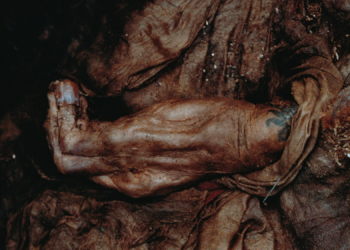Greg Ginn would really rather not be doing this. The co-founder and only constant member of Black Flag, the Southern California band that came to define hardcore punk in the late 1970s and ’80s, hadn’t given a formal interview in 13 years, savoring what he called a media “retirement.”
In April, he rebooted Black Flag with three new bandmates, which was not exactly notable for a group that requires a color-coded chart to keep track of its former members. But this time stood out because the collective age of those musicians — the singer Max Zanelly, 22; the bassist David Rodriguez, 21; and the drummer Bryce Weston, 22 — was less than that of Ginn, 71.
“I decided that it would be a good time where I should explain stuff,” Ginn said in a video call from the band’s practice space, his hair silver, his smile crooked. “Even though, honestly, I find it distasteful.”
Black Flag has never needed much help to reach its fans. As a teenager in Hermosa Beach, just south of Los Angeles, Ginn started his own mail-order electronics company, Solid State Transmitters (SST), and fostered a niche community of audio nerds through zines and radio waves. When he became a musician, SST morphed into a record label and the D.I.Y. mentality remained. With Ginn’s brother Raymond Pettibon providing art (including that ubiquitous Black Flag logo), everything remained quite literally in house.
As Black Flag increased in popularity, putting out easily misunderstood ironic anthems like “White Minority” and “Six Pack,” it was most likely to show up in the press for something negative — like its occasionally out-of-control shows, which the police regularly interfered with. Historically speaking, Ginn would prefer to let the music do the talking, unless, as in this case, he has something he wants to say.
The band’s most recent rebirth wasn’t orchestrated as a grand statement about age or the flagging vitality of legacy bands: “It really just ended up that way,” he said. “I was open to anybody, and I got a lot of responses, but I think when people hear us play, they’ll realize that they’re just the best people to do it, music-wise.”
After the former pro skater Mike Vallely quit as lead singer earlier this year, Ginn said he wanted to reconfigure Black Flag with members who live near him, in Thorndale, Texas (population: less than 1,500), an hour outside Austin. Rodriguez, who was working at a restaurant, and Weston, who was teaching drum lessons at a School of Rock, heard about the open call through social media and sent in videos, not expecting much. After auditions, Ginn, who acts as his own band manager, told the previously gigging musicians they were official members of Black Flag.
“It was cool being able to go back and tell my students,” Weston remembered, “‘I’m now the drummer for this band I was teaching you the songs of, like, a year ago.’”
Zanelly didn’t try out to be the first woman to front the group, following in the sweat-drenched footsteps of punk giants like Keith Morris and Henry Rollins. Ginn actually asked her, after she caught his attention in the front row of a Black Flag concert, singing — or maybe screaming — along to every word. A few months later, when he needed a new singer, “she was the only person I could imagine doing it,” Ginn said.
“I was just like, ‘OK, [expletive] it,’” Zanelly said. “Like, when is an opportunity like this going to come in my life ever again?”
Zanelly had never been in a band, much less one that would assign her a role as demanding as singing “My War” every night on a world tour. But she shook off the initial trepidation and embraced a “fake it till you make it” mentality. “The first day at practice,” she said, “I was like, ‘Yo, I’ve never screamed into a mic before.’ I remember driving home from my waitressing job and losing my voice in the car because I would be screaming the Black Flag songs.”
The collision of youth and history in this case can be a little jarring, especially when the band is onstage together. But from a different angle, watching someone like Zanelly pace around with a mixture of fury and bemusement feels in line with the original spirit of the music. After all, the core Black Flag catalog was mostly written and performed by people when they were in their early 20s — the age at which the complex, stymied emotions of hardcore punk often seem to be overflowing. Rollins quit his job at Häagen-Dazs to join Black Flag in 1981. He was 20.
“Robert Plant was 19 when Led Zeppelin started,” Ginn noted. “On the other hand, there’s a prolonged adolescence with a lot of people into their 20s and 30s. So I know it’s a different time, but I think it’s more dependent on the person.”
Unsurprisingly, the de-aged Black Flag has been seized upon as the butt of the punk world’s jokes. But Ginn, who said he’s “not on the social medias,” insisted he doesn’t pay attention to any of that. “I mainly listen to people that come to our shows, and I care about what they think,” he said. “Because there’s always somebody in their mom’s basement on a keyboard that knows how to run the world.”
Beyond jokes, though, broader criticisms of Ginn have stacked up over the years. Jim Ruland’s 2022 book, “Corporate Rock Sucks: The Rise and Fall of SST Records,” documents numerous accusations of missing royalty payments for artists on the label, once the home of a huge trove of epoch-shifting alternative rock by acts like Sonic Youth, Hüsker Dü and Meat Puppets. Ginn blamed various distributors going bankrupt as the reason for lapses in the label’s ability to pay. “All I’ve tried to do is not go bankrupt, and keep going,” he said.
There have also been business-related legal battles, like in 2013 when Ginn sued former Black Flag bandmates, then performing as Flag, for copyright infringement. (The case was settled.) There have been personal legal battles, like in 2014 when Ginn’s ex-wife filed a motion to take custody of their two children, accusing Ginn of child abuse. (Ginn said the court ruled for him to retain custody; the case information is sealed from the public, and Ginn’s lawyer said none of the allegations “were ever sustained by the court.”) And there have been so many acrimonious splits with former Black Flag bandmates that it seems difficult to find someone who doesn’t have something negative to say. Through a representative, Rollins “declined with great enthusiasm” to an interview request for this article.
Kira Roessler, Black Flag’s bassist from 1983 to ’85 (and the only female member of the band until this new lineup), isn’t quite sure if a band built over and over like a musical Ship of Theseus is in the spirit of punk. “Especially as old punk rockers,” Roessler said, “what is resistance now? Is Black Flag going on tour rebellion and resistance the way it was then? Or is it a [expletive] Elvis impersonation?”
Ruland, the author of the SST book, said in an interview that he finds the concept of Zoomer Black Flag intriguing, but still wouldn’t pay to see it, based on what he’s learned about Ginn. “It’s just such a track record of the way people leave that band,” he said. “It’s never pretty.”
Seven months into their Black Flag experience, Zanelly, Rodriguez and Weston have only good reviews of Ginn, and noted the possibility of new music in the band’s future. The ongoing tour, which wraps at Coachella in April, has been smooth sailing, aside from Zanelly chipping her tooth on a mic. “Some weird experiences,” Zanelly noted, “but not any bad ones.”
“It’s definitely way better than our last job,” Rodriguez said, laughing.
As a business-oriented punk entrepreneur — an oxymoron if there ever was one — Ginn has never made much sense as a hardcore icon. He’s written some of the fastest, nastiest songs in the rock canon, and yet he loves cats, the Grateful Dead and his natural fertilizer business. His scuzzy, improvisational guitar playing often has more in common with jazz musicians than Johnny Ramone. And he speaks at a glacial pace, like someone about to fall asleep, but has enough energy to drive the tour van every day by himself.
At this point in his unusual career, does he feel understood? “Of course not,” he said, adding that he doesn’t really know what people think about him at all. “I’m more interested in growing plants and stuff.”
Asked if he had any regrets in his career — anything at all — as he approached the 50th anniversary of Black Flag next year, Ginn said, “No, not really.”
Ginn seemed a little more caught up with the roundness of that number: a half century since he was just a young man in the South Bay, obsessed with electronics and buzzing with a frustration at the world that perhaps he still doesn’t know how to totally articulate. “I didn’t realize that it was going to be 50 years,” he said, mulling it over.
“When the band started, I expected it could find interest with people,” Ginn said. “So I didn’t think it was just going to be a momentary thing. That’s a question I get asked a lot is, like, ‘Did you think it would last three years?’ or whatever. And I thought, ‘Well, it could last as long as we want it to.’”
The post Black Flag’s Latest Reboot Has Everyone Talking (Even Greg Ginn) appeared first on New York Times.




